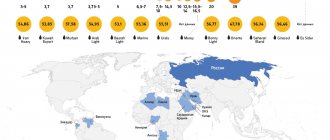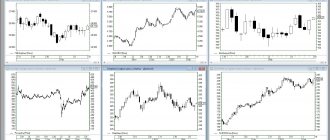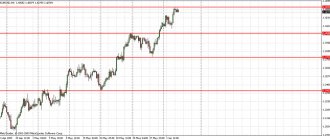Recently, more and more Russians are investing in stock market instruments. The myth has long been dispelled that investing is like a game of chance in which, sooner or later, every penny will be lost. With proper risk assessment and the right amount of theoretical knowledge, you can create a balanced investment portfolio that will work for you and your goals. We'll tell you how to learn to invest from scratch in our article.
The essence of investors
According to many, an investor is a millionaire who must invest millions in financial instruments. This was the case before, because in the 20th century only a really rich person could afford to invest in securities or precious metals. Now you can become an investor with only 1,000 rubles, since the number of areas for investment has increased significantly.
An investor is a person who invests money in various assets. The purpose of which is to increase capital.
Investment is an investment of finance with an expected return in the form of fixed income or interest. Even opening a deposit will be one of the ways to invest. But only those who use different financial instruments will be a full-fledged and effective investor. Thus, the investor wisely distributes his funds in different directions:
- securities (stocks and bonds);
- startups;
- antiques and art objects;
- precious metals;
- real estate;
- foreign currencies.
Choosing a broker
You must buy and sell securities through a brokerage or individual investment account. When choosing a broker, pay attention to the following parameters:
- license;
- accreditation on exchanges and popular trading platforms;
- commission (fixed fee or percentage of the transaction);
- threshold for entering the stock market.
Many brokers provide clients with online trading services. You just need to select the stock market instrument you are interested in, top up your account and create a request to buy/sell a security.
Financial instruments for investments
Financial instruments vary in profit level, reliability and payback period.
The following options are suitable for novice investors:
Bank deposits
Most financial institutions offer several deposit programs. Thanks to them, a person receives regular interest on the invested amount. And after the end of the contract he can take it away. Thanks to the state deposit insurance program, the instrument is practically risk-free, but the level of profitability leaves much to be desired. The peak interest rate offered by banks hardly reaches 8%-8.5%. Inflation hardly stops.
Bonds
Bonds are securities that involve investments in companies. At the same time, they are quite reliable, providing returns higher than deposits. The average interest rate on bonds is 10%.
Stock
Shares are a bond-like instrument that involves allocating a share of a company. That is, an investor can influence the development of the issuer of shares by voting for decisions of the board. But shares are also risky instruments, since their income depends on the profit of the company.
Mutual funds
Money is invested in organizations that manage it. Such companies form a whole portfolio of assets, alternating them according to profitability and risks. As a result, analysts skillfully combine different tools to increase profits. The investor receives a share of the profit of the entire fund without even understanding the intricacies of its work.
Real estate
This method is only suitable for people with above-average income due to the high entry threshold. As a rule, real estate is purchased at the initial stage of construction. And then sold at a higher price. It is also possible to generate income by renting out. In developed cities this is the most popular method.
Precious metals
These can be bars, coins, or impersonal metal accounts. The last option is best for a beginner. Since the entry threshold is very low, and the risks are minimal. But the slow rise in gold prices will not allow you to receive significant income in a short time.
Hype
Beginners can consider investing in HYIP projects as they do not require a lot of capital. This method is highly profitable, but carries great risks for capital.
Read more: HYIP projects that pay.
Naturally, it is better to combine these methods of earning money. But before that, we should take a closer look at how to become a successful investor.
Tip 2. Invest even the smallest amount
Do you think 100 rubles won’t make a difference? And you open the “Calculator” application on your computer and calculate the effect of compound interest. How many rubles will your hundred square meters become in 50 years if you charge 10% per annum on it?
Wow, I was also shocked at first. 11,740 rubles. Think about it, if you invest a hundred bucks on these terms? They will turn into almost 700 thousand rubles at the current exchange rate.
Now think about it, if you add these 100 rubles or 100 bucks every month? It won't hurt you, will it? The result is 128,130 conventional currency. And if not 100, but 1000? Answer: 1,281,299. That’s what life-giving interest does!
Yes, of course, there is also inflation. But you can put it on your shoulder blades! If inflation is 5% and your return is 10%, then you earn approximately 5% profit.
And here’s another interesting article: What is an investment portfolio and why is it needed?
In general, the purpose of this entire calculation is to prove that even small amounts set aside now will make you a millionaire in ten years. You just need not buy this delicious cupcake and a very interesting game on your smartphone today, but put money aside in a brokerage account and buy a tasteless and not at all interesting Gazprom share.
Investing for beginners - where to start?
Investors take risks even with the most secure investments. The process of becoming a beginner is divided into several stages. They must be completed in order to become a successful investor and minimize the possibility of failure.
Expert advice on where to start investing for a beginner:
1. Learn the basic concepts of economics
Financial instruments can decrease or increase in value under the influence of many factors. And the higher the promised income, the higher the risks. Economic self-education allows you to correctly predict fluctuations and assess the risks of capital loss. You can find useful information in specialized literature on investments. Thematic webinars and offline trainings are also suitable. Good results come from personal consultations with experienced financiers. It is important to compare information from different sources, forming your own strategy based on it.
2. Psychological preparation
Even if you fail, it is important not to give up. You should prepare a contingency plan and remember that not everyone succeeds the first time.
Find funds for investment
Don't invest your last money. Also, you should not take part of the funds needed for personal needs. It is better to plan monthly savings that will form the starting investment capital without compromising your needs. It is best to increase income while optimizing expenses. This is how personal accounting is formed. It is not recommended to use credit funds borrowed from friends, acquaintances, or relatives for investments. If the investment is unsuccessful, you will not only not earn money, but will also remain a debtor.
Explore the field of investment
You need to know the terminology. This will help you quickly process information received from specialized sources.
Choose a strategy
To become a successful investor, it is worth figuring out in advance where you will invest. Your strategy can be conservative, involving financing of low-risk instruments. Or it can be aggressive - if you want to maximize your earnings, but losing money is not scary.
So, in order for a future successful investor to start his journey, he needs to have money for the initial investment. Basic knowledge of investing and economics is desirable. With such baggage, he will be able to assess the prospects of his investments, making them more thoughtfully.
Tip 3. Save on fees and costs
Some management companies (no, don’t be afraid, not the criminal code, but the Management Company) charge 1-2% for the purchase of shares of their mutual funds. For example, Sberbank Asset Management. Here's the proof. You will also have to pay for the sale of the share and also a commission to the manager for his fantastic (or not) work.
But ETFs can be bought on the stock exchange without any dancing with a tambourine and without commissions. And their effectiveness is amazing. Here's an article about ETFs with all the details.
If you can save, why pay more?
If you prefer independent trading, then calculate in advance how much money you plan to spend on this business. And choose a broker to pay him less. Here is a list of brokers who charge very little for their services.
What should be the starting capital?
As you already know, in order to become an investor, you do not have to be the owner of a million-dollar bank account. You can start with 1000 rubles. This is exactly how much will be enough to buy some shares. At the same time, the minimum investment in mutual funds is often limited to 5,000 rubles. And to become an investor in HYIP projects, sometimes just $10 is enough.
In addition to starting capital, you need to take care of the presence of a financial “airbag”. This is a reserve of funds that will allow you to live without compromising your needs for six months, including spending on liabilities (debts). Typically, these funds are reserved in case of investment failure and are used only as a last resort.
The more money is invested, the higher the income will be. But as a beginner, you shouldn’t invest all your funds at once. To get started, a small capital is suitable - 50,000 rubles. This will allow you to try market trends for yourself, avoiding losing all your savings at once.
Tip 7: Diversify
Don't put your eggs in one basket. Today gold shows good results, but tomorrow it will collapse. Yesterday, shares of Russian manufacturers fell amid further rumors, and today they showed +20% growth.
It is impossible to predict market behavior. You're not Nostradamus. And trying to make money on any one investment idea is the height of stupidity.
Therefore, put together a good portfolio of stocks, bonds, ETFs and, probably, mutual funds. And you can dilute it with something exotic, for example, PAMM accounts, cryptocurrencies, damn them, or investments in Zaymoteka / Alfa-Stream.
How to achieve success in investments - basic rules
Success is individual and depends directly on the person making the investment. There is no single guide that will allow everyone to achieve heights in investments. Therefore, situations arise when even experienced investors lose part of their invested funds, although their risks are minimal.
But there are some generally accepted rules. If you follow them, you can protect yourself from failure without becoming bankrupt due to a thoughtless investment.
Let's look at the TOP 5 rules on how to increase the likelihood of investor success:
1. Invest in multiple instruments
In financial language this is called diversification. This rule consists of distributing funds in different areas, both safe and with high risks. It is necessary to choose different industries so that in the absence of profitability from some investments, the situation is not so dire, thanks to the income from other investments.
Clear goal
You can never achieve success without having an end goal in mind. When drawing up an approximate scheme for generating income, you need to imagine what it will be spent on. It could be just money or a material item purchased with profit. The goal must be real in order for it to be realistically achieved. And after achieving it, you can set another, more global one.
Collective investments
To minimize risks, you can find like-minded people who will be willing to share the costs of investments for a percentage of the profit. As a rule, this will help to gain new experience and reduce the risk of investments. After all, like profits, risks are also shared among all investors.
Don't stop there
Continued success is never guaranteed, so losses may occur for all investors. In any case, you cannot stop your activities. It is better to analyze unsuccessful transactions, drawing conclusions on their basis to improve the investment strategy.
Self-study
There is never too much knowledge. This is especially important in the field of investing, which regularly changes and improves. Therefore, you should constantly analyze information and gain new knowledge, because this is, first of all, an investment in yourself and your future.
Read more: investment rules.
Definition
First of all, you need to understand what “investment” is. Investment is the investment of certain funds into something in order to obtain a specific result. Moreover, the result can be not only making a profit in monetary terms. As an example, by paying for our children’s education, we are making an investment in their prosperous future. The state builds a school or kindergarten - this is a social investment. But still, for a private investor, the result will be the preservation and increase of their savings.
Calculation of profit from investments
Friends, this article is written based on my personal experience and does not constitute investment advice. Before starting this activity, be sure to complete step-by-step training (lessons) on investing from scratch.
Evgenia Artamonova – author of the article
The main mistakes of a novice investor
The greatest number of mistakes are made by novice investors who do not understand the features of investments. There are typical errors that are made during their work, so it will be useful to sort them out.
Common mistakes of a novice investor:
Small starting capital
To gain initial experience, an amount of up to 100,000 rubles will be enough. It’s true that you won’t be able to get a decent income from them. It is necessary to prepare more funds in advance so that after selecting the most convenient instrument, you can invest all your finances. Otherwise, collecting a significant amount will take a long time, during which the market situation may well change.
Desire to make quick money
Promises of huge and quick profits are associated with either high risks or fraud. You should not strive for quick, but one-time income. It will be much more effective to determine a stable scheme for yourself, even if it brings average profits.
Lack of knowledge
You need to fully understand the operating principle of the investment object. If there is not enough information, then any unforeseen situation will lead to loss of funds. And you won’t be able to fix it precisely because of a lack of knowledge.
Use of loans
As mentioned above, when starting to invest, it is important to use only your own funds. Even the “safety cushion” created in case of loss of investment cannot be used. If it fails, financial stability will be lost, which is guaranteed by a reserve of funds. The situation is the same with loans. After all, if your investment fails, you will not only lose your funds, but you will also owe money to the lender, which will lead to worsening financial problems.
Thus, if you want to earn income, you need to learn all the typical mistakes of beginners , trying not to make the same ones in your practice. You cannot believe promises of high guaranteed profits and take out loans for imaginary income. In addition, you should understand the subject of investment as much as possible, which will allow you to understand its pros and cons, as well as sensibly assess the risks.
Briefly about the main thing
In conclusion, I would like to note that there are quite a lot of scammers . Beware of them. If you are offered an incredible 100, 200, 1,000 percent per annum, then these are scammers. A good investment portfolio can bring you 10 to 15% profit per year.
Investing is quite an interesting job that brings good income. Don’t “lose your head”; during your first steps, try to comprehensively consider the instrument and the subject of investment, and then it will bring results. You can not only preserve your capital, but also increase it.
If you find an error, please select a piece of text and press Ctrl+Enter.
Books for Beginner Investors
Mastering the nuances of investing yourself is quite difficult. The very decision to do this threatens failure. Therefore, you need to get acquainted with the relevant literature, which is interestingly written and, using specific examples from the experience of the authors, allows you to consider the features of investments.
Peter Lynch The Peter Lynch Method. Strategy and tactics of the individual investor."
This work will give a clearer understanding of market trends and business processes. It is based on the real experience of successful investor Peter Lynch. Phenomena that are difficult for a beginner to understand are presented in simple language using real examples, which simplifies understanding.
2. Benjamin Graham “The Intelligent Investor.”
A book written by the mentor of one of the richest people on the planet, Warren Buffett. Will give a lot of valuable advice to the reader. In addition to purely financial recommendations, psychological mistakes of investors that can lead to failure are considered.
Thomas Stanley "My Neighbor is a Millionaire."
For investors with average income, the book will be a reference guide, as it contains tips on optimizing expenses. This is what will help you collect the start-up capital necessary for your development as an investor.
4. Warren Buffett, Lawrence Cunningham “Essay on investments, corporate finance and company management.”
Don't let the title of this book scare you. This is a fairly easy to understand book, or rather a collection of letters from Warren Buffett to his shareholders. But together they form an excellent guide for investors who want to succeed.
Robert Kiyosaki, Rich Dad's Guide to Investing.
A legendary author who talks about how you can become rich. In this book, he shares his investment experience. Using real examples, Kiyosaki not only talks about the principles of investment, but also gives advice, considering the main mistakes of investors.
Of course, you can find many more books on investments, but you should start with the collections listed. They are written by experts in their field, and the presentation is clear even to beginners, which makes self-learning as effective as possible.
Don't worry about market downturns
Everything in this world develops cyclically and the stock market is no exception. Here, as nowhere else, the phases of growth and phases of decline are clearly manifested. When the market is rising you enjoy an increase in the value of your investment portfolio, but in times of decline when the value of the portfolio decreases you may be tempted to sell everything and forget about investing in stocks as a bad dream.
However, such a decision would be fundamentally wrong. As I already said, recessions are an obligatory component of the development of the stock market, they are inevitable and, what is especially important, they are always replaced by subsequent rises. To see this, just look at the historical data:
SP 500 index chart
To ensure that a stock market crash does not become a reason to sell off your investment portfolio, you must, first of all, take a long-term view and be patient. In addition, you must have a reliable reserve fund (which we discussed in point 1).
Finally, remember that a crisis is a time of opportunity and during a market downturn you are given an excellent opportunity to cheaply purchase some securities that interest you.
The most successful investors
To become an investor and increase motivation, it is advisable to get acquainted with the success stories of the richest people. They were able to invest wisely, ensuring a comfortable life for several centuries to come. Let's consider who a novice investor should look up to, and who are they - successful investors in Russia?
- Sergey Belousov - owns the Runa Capital fund with a turnover of more than 135 million US dollars, focuses on the field of IT technologies.
- Yuri Milner - thanks to the fortune he earned, he became a member of the “Midas List”. He is a co-founder of the DTS fund, which invested in Facebook, Zygna, and the Groupon service. In addition, he invested in Alibaba Group and Twitter.
- Victor Remsha is also involved in Internet projects and runs the Finam investment fund. He invested in Banki.ru, the horoscope service AstroStar and companies involved in the creation of video games.
- Alexander Galitsky - owns the Almaz Capital Partners fund, prefers to invest in space and energy technologies.
- Eduard Shenderovich is also involved in Internet projects, developing gaming sites and services for providing discount coupons. The investments also include a hotel booking site.
If you figure out who the most successful investor in the world is , Warren Buffett will definitely take this position. He began increasing his capital at the age of 11, purchasing his first three shares of a local company. As of 2021, his net worth is $86.6 billion. Given his experience and successes, it is important to familiarize yourself with his book. But don’t forget about other authors, because Buffett himself also gained his first knowledge from books about doing business.
To become an investor, you need to choose a financial instrument, find start-up capital and gain at least basic knowledge about investments.
To increase motivation and get useful advice, you can read books for investors. The main thing is to invest carefully, diversifying your investments. This is what will help you become an investor from scratch, avoiding failure at the beginning of your career.
Strategy
How to start investing ? A strategy is required, any expert will tell you that. Strategies can be classified according to certain criteria.
Willingness to take risks:
- conservative - when a person wants to invest for the long term, but is not ready to take risks, chooses simple, reliable instruments;
- moderate;
- aggressive - the user is focused on high incomes and is ready to take risks.
By date:
- short-term up to 1 year - this is most often called not investing, but speculation, trading;
- medium-term 1-3 years;
- long-term over 3 years.
In the latter case, the task is to form a balanced investment portfolio, which consists of different instruments - to diversify. And with this portfolio you move and improve.
Robert Kiyosaki "Rich Dad's Guide to Investing"
- Electronic version on liters.ru
- Paper version on labirint.ru
* the electronic version of the book can be purchased and downloaded in the following formats: fb2, epub, pdf, txt.
The world-famous investor and writer continues to write on the topic of thinking of a rich and poor person. He does this not as a financial scientist who writes a textbook on finance, but as a practicing investor who has had a very good teacher in his life.
It is on the advice of this teacher that the entire book is built. It is written in a language understandable to everyone, even a novice. For example, have you heard about the economist Pareto's rule that 80% of our results come from only 20% of our efforts? Rich dad R. Kiyosaki disagrees with this statement. In his opinion, it works differently in the field of investment: “90% of the results come from 10% of our efforts.”
The book would not be so popular without live practical examples. You read it like an autobiography, you involuntarily try on advice from an experienced investor and learn to implement them in life.
Well, the main advice from rich dad: “Don’t be average.” Why not a guide to action?
29.07.2020
1 444
10 Best Investing Courses for Beginners and Experienced Investors
Hello, friends! I would become an investor, let them teach me......
Tip 10. Don't trust analysts
The most important advice. Don't trust Kiyosaki. Tony Robbins. That guy from BCS whose 60% of his predictions come true. And a summary forecast from the Tinkoff broker. And even to me.
Because no one knows what the market will do tomorrow. Yes, people are making some calculations, planning... And Trump will get up in the morning and think: “Something in my head hurts, I’m in a lousy mood... I’ll go and hurt Russia, maybe things will get better.” And introduces a ban on the import of blue lobsters to Russia. And we are in panic: stocks are falling! And all the forecasts of civilized men from EuroNews, that the MICEX index will grow, will go down the drain.
In general, don’t believe, don’t be afraid, don’t ask. Think yourself. Rely only on your experience and intuition. And make your own decisions. In the world of investing, you are your own captain. And you yourself are responsible for your actions.
In short, good luck to you, good mood! Hang in there!
Rate this article
[Total votes: 3 Average rating: 5]
Blog of Alexander Ivanov
Website: https://investbro.ru Cost: free
Learning to invest from scratch: a step-by-step algorithm and accessible training programs for beginners.
To begin with, I would like to say that investors are not born. Even the most toothy “financial market sharks” were once vulnerable juveniles and, for the most part, lost their capital more than once.
At the same time, the image of an investor has long ceased to be associated with a leather bag stuffed with millions of dollars in capital. A person who bought company shares for a thousand rubles is already an investor.
An investor is someone who has invested their money in a certain instrument in the hope of increasing it in the future. Any financial investment with the aim of increasing it is an investment.
Another question is how profitable these investments will be. Here it is important to wisely choose an investment instrument, i.e. what you will invest in.
Investment instruments differ in payback periods, degree of profitability, level of risk, etc. The investment portfolio of an experienced investor always contains several different assets: this increases the efficiency of the portfolio and reduces risks.
You will understand the very first steps that need to be taken before practical investment. Many find it difficult to even start due to an internal barrier. Questions immediately arise: can I cope, and is it worth risking my money?
You need to prepare yourself in advance for the fact that the market is unstable, asset prices may fall, and as potential profits increase, risks will invariably increase.
It is worth starting with small, low-risk investments, gradually increasing your portfolio, increasing your knowledge and self-confidence.
It is important to understand that you should invest only available funds: not borrowed and not from your last salary, but accumulated as a “safety cushion”.
Investing is not a set of chaotic actions, but a clearly planned strategy. Approach the analysis of financial instruments wisely, select several and distribute your savings between them in a suitable proportion.
Tip 9. Buy low, sell high
Well, I already talked about this. Now prices for OFZ are at the bottom - take it while it’s cheap! I bought RusAl when sanctions were imposed against it. It fell below the baseboard, and I picked it up. In two months I earned 26% profit.
The same with Sberbank. So what will happen to him? And when sanctions were introduced, shares fell by 5%.
You buy promotional items from the supermarket, even if you don’t want to? 2 sausages for the price of 1 are more interesting than 1, right? And with securities the same parsley. When the market has a sale and sells two shares for the price of one, why not grab it?
Tomsk State University of Control Systems and Radioelectronics
Website: https://stepik.org Cost: free
The ability to invest money correctly and analyze the economic situation is one of the important qualities of a modern economist.
To learn the basics of investing, you must first master the science of proper savings and study the characteristics of each financial asset. It is also necessary to understand when it is most appropriate to invest in a particular asset.
Choosing the right time to invest is half the battle. It is important to remember about the amount of capital. It is necessary to select investment assets in accordance with the amount of available funds and the level of risk underlying the asset.
Being financially literate is a necessity dictated by the times. This course will help you acquire the necessary knowledge on the basics of investing and personal finance management.
After studying this course, you will learn how to plan a personal budget, draw up a personal financial plan, determine the necessary investment instruments, and evaluate the effectiveness of investments in various financial assets.
An original course developed taking into account the needs and capabilities of audiences of different ages and levels of training. The course will be of interest to economists, investment and financial consultants, accountants, financial analysts, and anyone who wants to understand the basics of successful trading transactions with financial instruments to improve personal well-being.
Vladimir Savenok “Create your personal capital”
- Paper version on labirint.ru
Until now we have considered foreign authors. You may get the impression that there are no similar books or successful investors in Russia. This is wrong. My favorite author is Vladimir Savenok. Active investor, financial advisor with many years of experience, frequent presenter of online webinars, guest of many reputable financial media, etc.
For me, he is a priority because his books are based on the realities of the domestic investment market. The considered tools and described models can simply be taken and implemented without looking back at the differences in foreign and Russian legislation.
V. Savenok has written and published several books on personal finance. I have already written about two of them on the pages of our blog. The value of this work is that it contains all the experience and investment tips for beginners. The author calls the book a self-instruction manual.
I gladly subscribed to the Personal Capital company mailing list, and they sent me this book absolutely free in PDF format. Since I am interested in the topic of personal finance both as a financial copywriter and as a novice investor, it became a real instruction for me.
I am sure that everyone will find answers to any questions they may have there:
- what is a family budget and how to draw it up;
- basic investment strategies, what mistakes beginners (and not only) investors make;
- investment instruments: securities, mutual funds, real estate funds;
- Internet trading;
- everything about the pension program, and how to make it so as not to depend on government handouts;
- and even how to save and borrow money correctly.
As the author himself says, you just need to take any section of interest, carefully study it in theory and apply it in practice.











